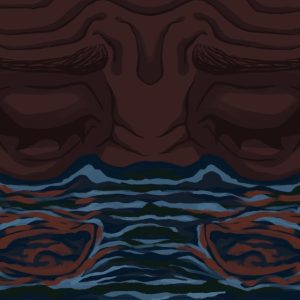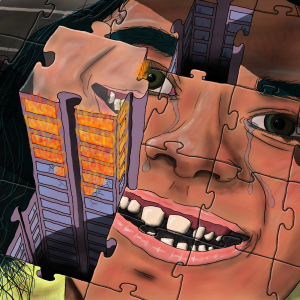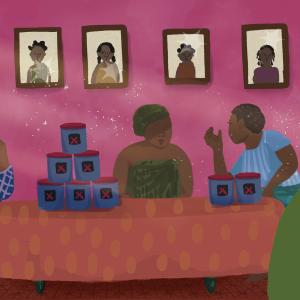By the time I see the lights of the guard post, it feels like night is already coming. The last of the day’s sunlight is diffused through drifting snowflakes and fading into a billowing white-out.
I’ve only been away a few days, but it feels longer, and, after the city, this border crossing in the middle of nowhere feels like a different world. The cold weather has arrived early this year. I’ve been stationed here for three years, and I’m still not used to it. Unlike most of the others in the unit, I’m a city boy and ‘cold’ feels colder out here.
Back in the days when the border existed only as a line on maps and was mostly unguarded, our crossing comprised only a raisable barrier and a guard-box. Now there are gates with a security station, and a fence cuts through forest. A wide avenue has been made through the trees, like a firebreak but wider. Running through it are two lines of wire — ours and theirs. On each side of this incision, the forest stretches for many miles. On our side, the forest has been hacked away to leave an empty strip of land behind the fence. On their side, the trees and undergrowth advance all the way to the steel mesh, which has, in places, been deliberately cut. When we built the new fence, our watch was increased from two men to three. It makes no difference out here, but back in the city, the politicians can say they’ve increased security by 50 percent. There’s talk of removing our crossing point altogether, welding the gates shut and blocking the road. Nobody uses it anymore. It’s too remote, and what traffic there was avoids it now because of the illegals.
*
As soon as I arrive, I sense something isn’t right. I feel watched, as though someone is hiding out there beneath the trees, where the winter sunlight doesn’t reach. I pause and hold my breath, scanning the treeline. The lights of the guard station look out across the no man’s land of the crossing. Snowflakes swirl under the floodlights above the road. I can’t see anything amiss, but I feel unsettled. The otherworldliness of returning to the border after my sojourn in the real world is disorientating. It could just be fatigue. It’s been a tough few days, seeing Lizzy like that and having to leave her with my mother when my leave was up. She understood, but all the same …
It’s a relief to know Harold and Gustavo are inside. There’s no way they’ll be out walking the fence in this weather, orders or not. There are nine of us in the unit, split into three shifts. I take a moment to gather myself before I go in. I’ve known these men for years, but I have to force myself to turn the door handle. I can’t muster the enthusiasm to shout a greeting when I enter, so, rather than make a fuss, I stamp the snow from my boots and slam the door behind me to announce my arrival. The hut is only heated by an old stove, but, after the biting wind outside, it feels tropical. I wave to Gus and Harold.
‘Welcome back. How’s Lizzy?’
‘She’s doing better, thanks.’
‘Still in hospital?’
‘With my mother now. Not sure who’s going to win that one.’
‘Sounds like you’re better off up here.’
‘That’s why I came back.’
‘Don’t drop snow everywhere, you wanker; it’s miserable enough in here.’
‘Sorry. The transport dropped me at the end of the road. I had to walk. It’s really coming down out there now.’
Harold kicks a chair towards the stove for me and hands me a hip flask. ‘Here. Keep the cold out. Cheers.’
I thank him, but I don’t sit down. If you sit you might get comfortable or, god forbid, get warm, and then it’s almost impossible to get going again, especially if you have to go out and walk the fence. Instead, I perch on a stool in front of the window — a slot that extends the full width of the cabin — and wipe the condensation from the glass so I can see out.
‘Any action since I left?’
‘Nothing. Too cold.’
We catch up. I tell them about Lizzy, and we share the sugared almonds my mother gave me. It’s nearly dark, and we’ve had almost a full pan of coffee when I see movement beyond the fences, a shadow flitting between trees. I hold my breath and reach for the binoculars. I feel Gustavo move up behind me.
‘What’s the matter? You see something?’
‘Yes. No. Maybe …’
The radio crackles, another station reporting in, the words lost in a sudden, loud burst of static. It distracts me for a moment, and when I look back, the shadow is gone. I keep the binoculars turned on the treeline and wait. Gustavo gets bored almost immediately and goes back to the stove.
‘Probably nothing, but keep an eye on it.’
As I start to relax, the hut’s single lightbulb pops gently and goes out. In the sudden darkness behind me I hear the clatter of a tin coffee mug falling to the floor and Gustavo shouting, ‘God damn it.’ I stay where I am, watching the shadows outside while Harold drags a chair to the centre of the floor, beneath the dangling bulb.
I don’t see what happens next, but I hear the sound of splintering wood and the bulb shattering. After the bang of Harold hitting the floor, there is a shocked silence before the swearing begins.
In the half-light, I can barely see what’s happened. Harold is on the floor with pieces of the shattered chair around him. He hasn’t been hurt badly enough to stop him swearing, but it’s clear that he’s injured, so I move to help. There is just enough light to see that the wooden leg of the chair has sheared off at an angle and pierced his fatigues, penetrating his calf.
Gustavo grabs the first aid kit and hands me a torch.
‘Hold this’, he tells me.
I point the light down, and he cuts open the leg of Harold’s trousers and the thermal base-layer beneath. The skin on his leg is deep purple and bulges out around the wound. Once Harold is able to see it clearly, he slumps back and groans, ‘Get it out.’
I struggle to remember what we were taught in basic training. ‘Maybe we should leave it in until a medic gets here? It might be stopping the bleeding.’
‘Fuck. Get on the radio then.’
I pick up the radio’s handset. ‘Control from Six. Control, Station Six.’
‘Control. Go ahead, Six.’
‘We have a medical emergency.’
‘Say again, Six.’
‘We have a medical emergency.’
A burst of static comes from the speaker, so loud that I jump back and drop the mic. ‘Jesus.’
‘What did you do?’
‘Nothing. It wasn’t me. It was the fucking radio.’
Gustavo grabs the mic angrily. ‘Control? Control?’ He tries a few times before dropping the handset. ‘Nothing. This piece of shit has been playing up all day.’
There is no cell-phone signal at the guard post, so that means only one thing.
‘We’ll have to take him in. Help me get him out to the car.’
‘We can’t leave the crossing unmanned.’
‘Obviously, dickhead. You stay here.’
‘What if something happens?’
‘Nothing will happen. Nothing happened yesterday or the day before or the day before that. It’s too fucking cold. Nobody’s coming through tonight, my friend.’
‘But—’
‘Got a better suggestion? No, that’s what I thought. Now, help me get this idiot into the car.’
We hoist Harold to his feet and carry him clumsily out of the cabin to our ancient patrol car. We lean him against the boot while Gustavo fumbles for the keys. It takes a while to get the doors open and scrape the windows clear of ice, so, by the time we’ve manhandled Harold into the back seat and Gustavo has squeezed himself in behind the steering wheel, my hands and feet are aching from the cold. Gustavo turns the key, and the engine turns over reluctantly, spluttering into life.
‘I’ll be back before the end of shift. Don’t let the stove go out!’
I watch the car lights disappear into a swirling vortex of snow.
*
I don’t go back indoors straight away. I’m nervous. If there is one illegal out there, there could be any number of them hiding in the trees; they’re rarely alone. A year ago, our counterparts across the border started bussing hundreds of them halfway across the continent, right to the border. They take away their phones and papers and point them towards the crossing, trying to overwhelm us. They started sending them in winter, knowing it would make things worse. Almost all of them come from hot countries. Some don’t even know what real cold feels like. They arrive wearing clothes designed for winters a thousand miles south of here.
Gustavo and I were part of the first round of push-backs. When the border was closed, plenty of them tried to make a run for it, climbing the fences or pushing through holes in the wire. The dogs got them, or the Tasers, before they could get through the second fence. As long as we kept them on that side of the border, they weren’t our problem.
Eventually they moved back, defeated, across the frozen scrub between the lines of wire, climbing through the far fence and retreating into the trees. All except one. He stood in the middle of no man’s land staring at me as I shouted at him to move back. He was wearing a thin, orange, summer jacket that he’d covered with polythene in an attempt to keep dry. When the others saw his defiance, they stopped, turned and waited to see what would happen. I knew if I didn’t turn him around there would be more trouble, but he didn’t even flinch when I raised my baton. He looked at me as though he was daring me to do something or testing me.
I was suddenly aware that I’d become separated from the rest of my unit. They weren’t far away, but far enough that I’d be in trouble if things took a turn for the worse. Orange Jacket and I stared at each other for a long, frozen moment, me with my baton in the air and him hardly breathing, weighing his options as I weighed mine. I knew Gustavo and the others were watching, and I knew something had to happen. I was relieved when he spoke.
‘Can you help us?’
‘Go back.’
‘Please, help us.’
‘Get back or we will open fire.’ I put my baton away and moved my hand to my holster to show him I meant business, but he knew I was bluffing. I could tell by his eyes that he’d been around the block a few times, seen stuff. Maybe that’s why the others — mostly youngsters — seemed to be looking up to him and following his lead. Not that it had done him any good; he looked as scruffy and fucked up as the rest of them.
‘What is your name?’ he asked.
‘It doesn’t matter what my name is; get back.’
At that moment, Gustavo shouted across the barrier, ‘Leto! Move back; they’re bringing up the water cannon.’ I could hear the growl of the truck’s engine coming up the road from our side of the fence.
‘Leto’, the man said quietly. ‘Help us, Leto.’
Interacting with them is the worst thing you can do. It’s bad for everyone. I don’t know what he thought I was going to do; maybe wave them all through the crossing and wish them luck. I didn’t answer, and he just stood there staring at me as I backed away towards the checkpoint. I ducked under the barrier, and when I turned back, he was walking slowly towards the trees where the others had already disappeared into the undergrowth.
Over time, they stopped trying to get through, but they didn’t leave. They just collected in the forest like driftwood piling up along the steel shoreline of the border fence. The news channels said the cold got most of them. They called it ‘the Rainbow Woods’ because of all the bright-coloured clothing and little tents left under the trees where they’d tried to shelter. But they say all sorts of bullshit on the news. After it all happened, I tried talking to Gustavo about it.
‘Do you think—’
‘No, I don’t fucking think. I do what I’m told to do, and so do you. That’s all there is to it.’
*
There haven’t been any mass intrusions since then, not on our stretch, but being out here alone puts me on edge. I check the gates and do a sweep of the fence. I linger near the crossing, watching the other side for as long as I can stand the cold. Everything seems in order. It’s only when I go back indoors and glance out of the window that I think I see a figure out there again. I wipe the glass and grab the binoculars. Just for a second, there is a flash of movement in the dark beneath the trees.
Without warning, the radio crackles into life, spitting loud static as it had earlier. I jump back from the window and snatch up the mic.
‘Gustavo, is that you?’
Only an electric hiss comes from the speaker.
‘Control? Control. Station Six. Can you hear me?’
Nothing. And then there is a voice, faint, accented; a burst of chatter, broken by interference and indecipherable.
‘This is Station Six. Who is this?’
The voice gets clearer but is still faint. ‘Hello? Hello?’
‘Who is this. Identify yourself.’
‘Hello …’
There is something familiar about the voice, and I consider the possibility that one of the others is playing a trick.
‘This is a military channel. Identify yourself.’
‘Help us.’
‘Who is this?’
‘Help us, Leto.’
I place the mic on the bench and turn off the speaker. I turn on the desk lamp and throw some logs into the stove then pour myself a coffee from the pan on the hob and add a splash from Harold’s hip flask. Through the window, I can barely see anything in the gloom beyond the fence. Snowflakes tap wetly against the glass, turning to droplets and running down the pane. Condensation makes it even harder to see what’s going on. But again I have a feeling of being watched from the black hollows at the forest’s edge. I take a baton from the cupboard and go back out into the cold.
The snow is falling harder now, and I can only see for 50 metres or so in each direction, a little farther when the wind drops, but the fence looks clear. In both directions I can see the wavering black lines of mesh extend out of sight into the swirling snow. I take another nip out of Harold’s flask and stamp my feet to keep warm. It seems quiet, but I know someone is out there, so, when I test the gate again, I make a show of it, and I give a thumbs-up to the cabin so whoever is out there watching me will think I have comrades inside.
I’m heading back to the hut, glancing over my shoulder when they appear between the trees, grey figures, standing, watching. I can tell by the way their clothes hang that they’re soaked. They must be freezing. And, out in front of them, I see a flash of orange and immediately think of the man who spoke to me a year ago.
I know it can’t be him, not after what happened. It’s just another nobody in a brightly coloured jacket. I move back towards the gates where I can get a clearer look. I can tell by his posture that he’s watching me, and I see something in the way he is standing, a passive defiance that mirrors the man I saw last year. Maybe he was stronger than the others and survived somehow. But why would he come back here, to the same crossing? Is it coincidence that he’s trying to cross here a second time? Or has he come here for a reason — for revenge? And why isn’t he better prepared this time; why not wear warmer clothing, something that would give him a fighting chance out here in the cold. Is it a taunt?
He’s coming closer. The orange of his jacket is the only colour in this landscape of grey and white, a flame burning in the half-light of the frozen evening. Behind him, the other shapes move out into the open, following. At first, I think there are 20 or so, but, when the falling snow clears for a moment, I see many dozens, maybe a hundred figures emerging from the trees, converging on the crossing.
I run back inside and start shouting into the radio, but it’s no good. The static coming from the speaker rises and falls in pitch, perfectly synchronised with the wind outside the hut. I turn to the window, but I can barely see through the glass. Beyond the lights of the crossing, the shapes advancing from the forest edge are lost in a blur of white and grey.
They must have brought wire cutters with them because, when I get back outside, they’re already in the no man’s land between the lines, and, although they seem to be walking slowly, some are already nearing the gate. It’s grown noticeably colder. The wind is cutting through my fatigues, and the snow is driving along the road and churning in waves through the crossing point. I hang back, standing beside the hut, shielding myself from the worst of the wind and keeping a safe distance from whatever is going on out there. The snow swirls thickly, obliterating my view of the figures gathering around the gate. When I’m able to see again, between the blinding flurries, they have passed through. Somehow, they’ve cut or broken the lock. Their advance is free from the usual shouts or chaotic scramble, and, at their head, I can see Orange Jacket moving towards me, and now I am certain that he recognises me.
I have nowhere to go that they couldn’t follow. I think about going back into the hut and barricading the entrance, but the door wouldn’t last long, and Gustavo won’t be back with the car for hours. I take out my sidearm and feel momentarily comforted by the compact weight of the gun in my hand. All the same, my hand is shaking as I raise it and fire into the air — two rounds — hoping to frighten them off, but the storm swallows the sudden shock of noise. The snow is getting in my eyes, but the flash of orange and the grey mass following it are getting closer, still moving directly towards me, undaunted by my warning shots, seemingly unafraid of any possible consequences.
I wonder what will happen when they reach me, what form his revenge will take, but he doesn’t even look at me. None of them do. Their faces are lost behind scarves and inside the hoods of thin, cheap coats, but they seem to stare straight ahead as they walk, as though they can see through the snow and trees to something beyond. When Orange Jacket reaches me, all I can do is stand aside. The others follow him in a ragged column. As they pass, they are almost lost from sight in another flurry of snow driven on the bitter wind. None of them speak. If they make any sound at all, it’s lost in the blizzard, and the falling snow erases their footprints as they leave the road and disperse beneath the trees, disappearing into the darkness beyond the crossing.
Subscribe for new writing
Sign up to receive new pieces of writing as soon as they are published as well as information on competitions, creative grants and more.



